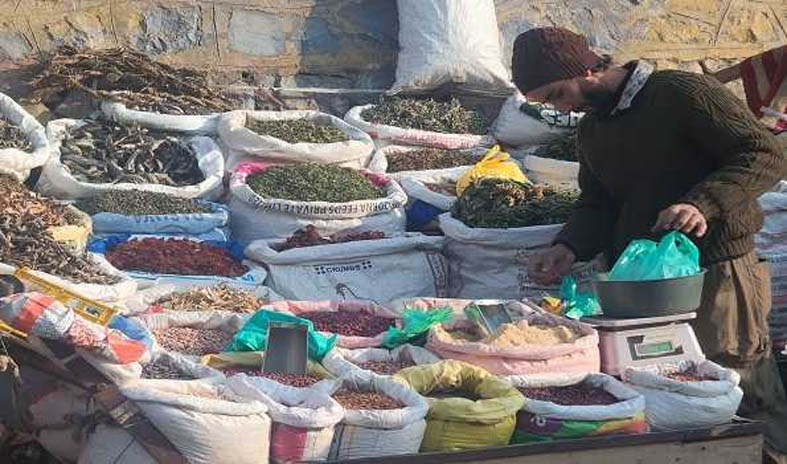Srinagar, Dec 14: Amid the winter chill, the demand for traditional sun-dried vegetables, locally known as “Hokh Syun,” has started picking up across the Kashmir Valley.
This age-old culinary tradition has endured through centuries, making Kashmir one of the few places where dried vegetables remain a staple even in modern times.
“Hokh Syun” includes sun-dried brinjals, gourd, turnips, spinach, tomatoes, and fenugreek—all locally cultivated during the summer months. These vegetables are dried to preserve them for the harsh winters, ensuring food availability when fresh produce is scarce.
The drying process, a common summer activity, involves women meticulously preparing the vegetables and leaving them to hang on house walls to dry under the sun.
During the winter season, the markets in Srinagar’s old city and other areas are filled with vendors selling sun-dried winter-special vegetables.
Among the many who sustain this tradition is 19-year-old Amir Rather, a resident of Damhal Hanjipora in south Kashmir’s Kulgam district.
Amir has been selling dry vegetables in Srinagar’s Dalgate area for over eight years, becoming the sole breadwinner for his family after losing his father 15 years ago.
“I was in grade IX when I had to shoulder the responsibility of my family,” Amir told UNI.
Inspired by villagers selling dried vegetables, he started his business in Srinagar, catering to the city’s high demand for “Hokh Syun.”.
“My vegetables are popular because they are hygienically dried and free of fungus,” Amir says.
The dry bottle gourd is usually sold for Rs 600 kg, dry tomato Rs 600 to Rs 1000 kg, turnip, Rs 200 Kg and Brinjal Rs 400.
Despite modern changes in food preferences and the availability of dehydrated and processed alternatives, sun-dried vegetables retain their place in Kashmiri kitchens. Medicos affirm that consuming these traditional vegetables during winter poses no health risks as long as preservatives are avoided and intake is moderate. (Agencies)




